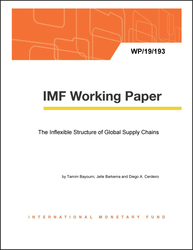
The Inflexible Structure of Global Supply Chains
The rise of global supply chains has had profound effects on individual economies and the global trading system, thereby complicating standard macroeconomic analyses. For many of the new and challenging questions brought about by this phenomenon, such as its impact on the global business cycle and measurements of competitiveness, the answer largely depends on one specific aspect of global value chains: how easily they can re-configure in response to changes in prices. We propose a parsimonious, generalized specification to test the degree of global-supply-chain flexibility. Our estimates show that, in the short run, the production structure is highly inflexible, and that this rigidity has, if anything, risen over time as supply chains have deepened over time. This finding is robust to alternative price measures, including those that account for the U.S. dollar’s outsized role in trade through invoicing. While in the long run all estimated elasticities rise, supply chains remain somewhat inflexible. Our results have implications for analyses of cross-country business-cycle dynamics, the propagation of sectoral shocks, and the measurement of international competitiveness.
Publication date: September 2019
ISBN: 9781513510569
$18.00
Add to Cart by clicking price of the language and format you'd like to purchase
Available Languages and Formats
| English |
Prices in red indicate formats that are not yet available but are forthcoming.
Topics covered in this book
This title contains information about the following subjects.
Click on a subject if you would like to see other titles with the same subjects.
Global supply chains , value-added trade , production and final-demand elasticities
Summary
Copyright © 2010 - 2026
Powered by:
AIDC



